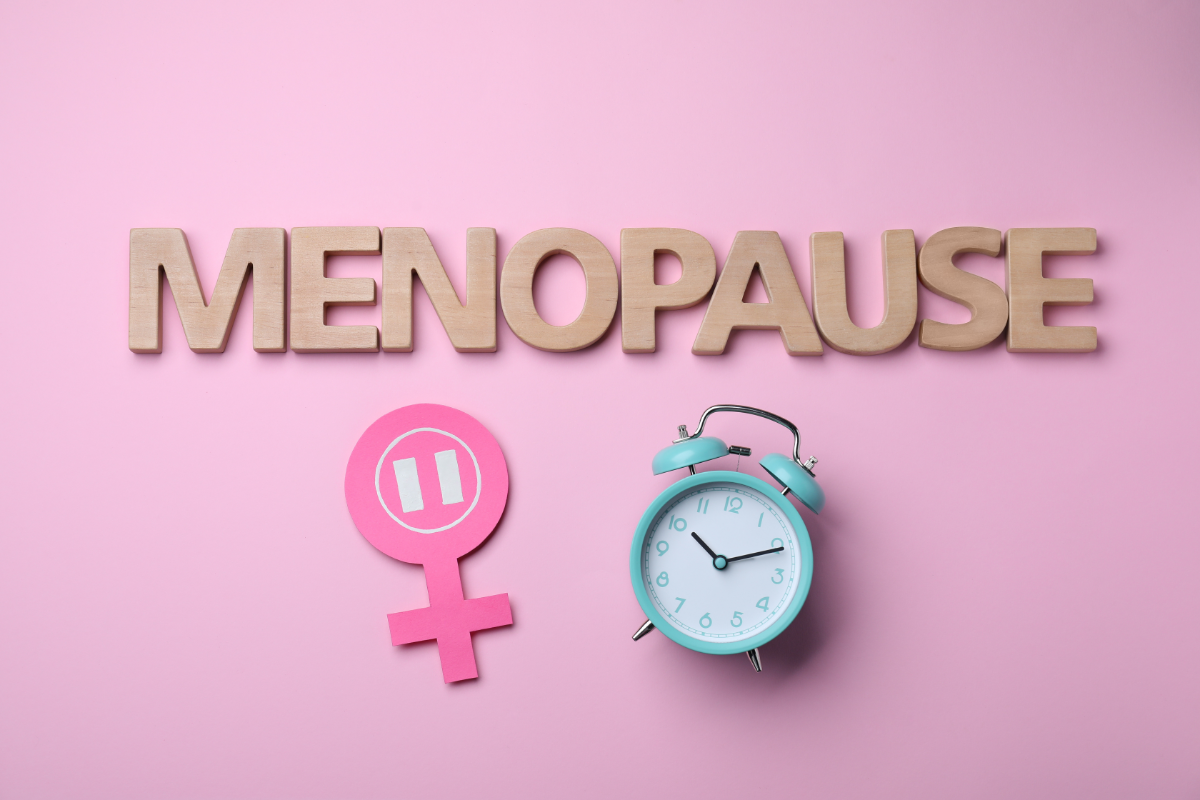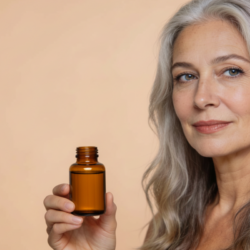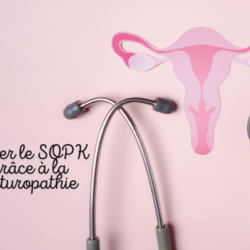The menopause is a physiological process which results in a cessation of ovulatory cycles due to a reduction in ovarian function.
The post-menopause is the period after the menopause (on average around the age of 55) for women. It is characterised by a number of events of varying degrees of discomfort: hot flushes, sleep problems, etc., resulting from significant hormonal changes due to the cessation of ovarian function. It should be noted that HRT (hormone replacement therapy) is now being strongly questioned, as the oestrogens prescribed are strongly suspected of increasing the risk of developing cancer. A late menopause requires gynaecological monitoring.
The physiological menopause is established by the absence of menstrual periods for a year, around the age of 50. However, going through the menopause between the ages of 41 and 58 is a normal situation.
Before the age of 40, when this phenomenon occurs, it is known as the “premature menopause”, most often due to non-iatrogenic ovarian failure, requiring hormone replacement therapy to prevent cardiovascular disease, weight gain and osteoporosis.
Smoking tends to bring menopause forward by one or two years. Conversely, obesity can bring it back.
How is the menopause diagnosed?
A certain number of symptoms may begin before the complete cessation of menstruation in the so-called “pre-menopausal” period
- Altered menstrual flow and cycle length
- Hot flushes, night sweats
- Vaginal dryness, painful intercourse
- Aging of the skin
- Urinary problems with frequent cystitis
- Constipation, diarrhoea
- Arthralgia, myalgia
- Weight gain, water retention
- Osteoporosis possible
- Character and/or mood disorders
However, it is important to approach this new life cycle with serenity and not to see it as a loss of femininity.
Naturopathic advice and plants to relieve menopausal problems:
To combat menopausal hot flushes:
- Avoid triggers (spicy foods, bright lights, eiderdowns, predictable emotional reactions)
- Cool the environment (lower the thermostat, use fans)
- Wearing layered clothing that can be removed as needed can be helpful
- Exercise to lose weight
- Eat more soya. The secret of its benefits lies in theequol (isoflavone) it contains. Isoflavones are plant polyphenols with the biological effect of weak oestrogens, which have a very interesting action in the post-menopausal period. Soya has been shown to provide effective relief from hot flushes.
It is useful to order this blend of fresh plant fluid extracts from the Pileje laboratory, namely Hop EPS + Clary Sage EPS . Hop has oestrogenic properties, and acts on hot flushes and sleeplessness during the menopause. Clary Sage acts on hormonal deficiencies that may play a role in mood disorders, sleep problems, hot flushes and possible circulatory problems.
The formula:
- Hops fluid extract 150 ml
- Clary Sage fluid extract 150 ml
- QSP 300 ml
Dosage: 5 ml mixed in a large glass of water twice a day for 1 month, renewable for 3 months.
Hot flushes last an average of four to five years.
To combat vaginal dryness due to the menopause:
- Take regular courses of vitamin B9. Folic acid promotes cell renewal and prevents damage to the mucous membranes
- Rebalance fatty acids with a course of omega fatty acids to promote hydration of the mucous membranes, including the vaginal mucosa.
- Take Chaste tree extractaction on hot flushes and vaginal dryness (5 ml mixed in a large glass of water 2 times a day for 1 month, renewable for 3 months if necessary)
Vaginal lubricants and moisturisers improve vaginal dryness on an occasional basis. Regular intercourse or other vaginal stimulation can help maintain vaginal function.
To combat menopausal skin ageing:
- Take a course of vitamin C. Ascorbic acid is a powerful antioxidant that combats skin ageing. In particular, it helps in the formation of collagen.
- Drink plenty of water
- Avoid smoking
- Protect yourself from the sun’s rays
Which plants to choose?
Sage hydrolate: A real plant facelift, apply to the skin with a cotton pad as a daily lotion
AlchemillaEPS: Powerful antioxidant, take 5 ml mixed in a large glass of water 2 times a day for 1 month, renewable for 3 months if necessary
To combat weight gain during the menopause:
- Eat fruit and vegetables every day (remember to eat fruit outside of meals)
- Choose the right sources of fats and proteins
- Get regular exercise
- Maintain a good level of hydration
- Avoid sugar, alcohol and trans fats
- Avoid low-calorie, light or 0%products(these products are not low-calorie; the sugar is simply replaced by sweeteners that have not been shown to be safe for the body, or they are low in fat. Studies have shown that consumers of low-fat products eat 30 to 50% more fat than consumers of conventional products.)
- Eat smaller meals and divide your food into smaller portions to avoid hunger pangs
- Never skip meals
- Have small protein- and fibre-based snacks between meals to avoid nibbling
Focus on the impact of a poor diet
Menopausal women: consuming soft drinks and sugary beverages can lead to insulin resistance and inflammation, which are strongly implicated in liver carcinogenesis!
Research published in June 2022 byLonggang Zhao’s research team at the University of South Carolina suggests that consumption of soft drinks and sweetened beverages is a potential avoidable risk factor for liver cancer in post-menopausal women.
This observational study involved 90,504 women aged between 50 and 79, followed over an average period of 18.7 years. It was conducted as part of the Women’s Health Initiative, a national long-term health study aimed at defining prevention strategies for the main causes of death, disability and frailty in post-menopausal women, such as heart disease, cancer and osteoporotic fractures.
Results: At the end of the follow-up, 205 women had confirmed liver cancer. 7.on average, 3% of them consumed 1 portion – equivalent to a 0.35-litre can – or more of soft drink or sweetened beverage. Higher consumption of soft drinks was associated with a 78% higher risk of liver cancer.
These results confirm the observations made by the NutriNet-Santé cohort monitoring the general population
The article published in July 2019 in the British Medical Journal by the French Nutritional Epidemiology research team (EREN / Inserm / Inra / Cnam / University of Paris) covered a population of 101,257 participants aged 18 and over, characterised by an average age of 42.2, followed for an average duration of 5.1 years. Consumption of sweetened beverages and artificially sweetened beverages was assessed using repeated 24-hour dietary recordings, designed to record participants’ usual consumption of 3,300 different foods and beverages. Once again, the researchers found that consumption of sweetened drinks was positively associated with the risk of overall cancer and breast cancer.
Which medicinal plants are useful for reducing the effects of eating disorders?
Lemon verbena hydrolate: Diuretic and lipid-lowering, take 1 tablespoon in a glass of water 1 to 2 times a day for 1 month
Ginseng EPS: Modulator of carbohydrate metabolism during the menopause, take 5 ml mixed in a large glass of water 2 times a day for 1 month, renewable for 3 months if necessary
Orthosiphon EPS: Elimination, drainage, water retention; take 5 ml mixed in a large glass of water 2 times a day for 1 month, renewable for 3 months as required
To prevent osteoporosis :
- Take a course of vitamin D (helps fix calcium and phosphorus in the bones and teeth, and also prevents osteoporosis, among other things, by helping to mineralise and repair bone tissue and joints), vitamin C (helps build and repair bones), calcium (promotes bone health) and silicon (promotes bone balance).
- It is also advisable to follow a course of Alfalfa EPS: Combats demineralisation, also indicated for skin dryness.Take 5 ml mixed in a large glass of water twice a day for 1 month, renewable for 3 months if necessary.
All the remedies indicated should not be taken at the same time, but should be adapted according to the symptoms, until the hormones have stabilised.
How can homeopathy help during the menopause?
Homeopathy can also play a major role in the menopause:
-
- Sepia officinalis 9, 15 or 30 CH: Acts on various functions of the body, particularly the nervous, digestive and venous systems. Dosage: 5 granules 1 to 2 times a day, or 1 dose a week.
- Lachesis mutus 7 CH: For hot flushes. Recommended dosage: 3 granules once a day
- Lachesis mutus 15 C: In insomnia, repeated excessive loquacity. Recommended dosage: 1 dose per week
- Glonoïnum 5 CH: For palpitations and pounding temples. Recommended dosage: 2 granules 3 times a day until improvement.
- Sulfur 5 CH: For night sweats and difficulty with heat. Recommended dosage: 2 granules 3 times a day until improvement.
- Veratrum album 5 CH: For cold sweats and malaise. Recommended dosage: 2 granules 3 times a day until improvement.
- Sanguinaria canadensis 5 CH: For red skin, rosacea and migraine. Recommended dosage: 2 granules 3 times a day until improvement.
- Lachesis 5 CH: If flushing is aggravated by alcohol or a hot jumper, etc
.
- Recommended dosage: 2 granules 3 times a day until improvement.
- Ignatia amara 5 CH: If puffs are aggravated by emotions. Dosage: 2 granules 3 times a day until improvement.
- Nux vomica 5 CH: If puffs after meals. Recommended dosage: 2 granules 3 times a day until improvement.
- Gelsemium 5 CH: For hot flushes aggravated by stress. Recommended dosage: 2 granules 3 times a day until improvement.
@soin.et.nature ?? Besoin d’aide pour gérer vos symptômes de ménopause ? Bouffées de chaleur, rétention d’eau ? Découvrez ces granules d’homéopathie ? Natrum Sulfuricum 7 CH, et Sulfur Iodatum 9 CH ? Utilisés depuis des années pour leurs vertus apaisantes, ces granules sont le secret pour retrouver l’équilibre ! ⏰ Essayez-les dès maintenant ! #homéopathie #angoisse #examen #santé #bienêtre #zen #granules #remède #tiktoksanté #anxiety #stress #HPRadicalReuse #menopause #menoposal #bouffeesdechaleur #jambeslourdes #retention #retentiondeau #prisedepoids #mincir





